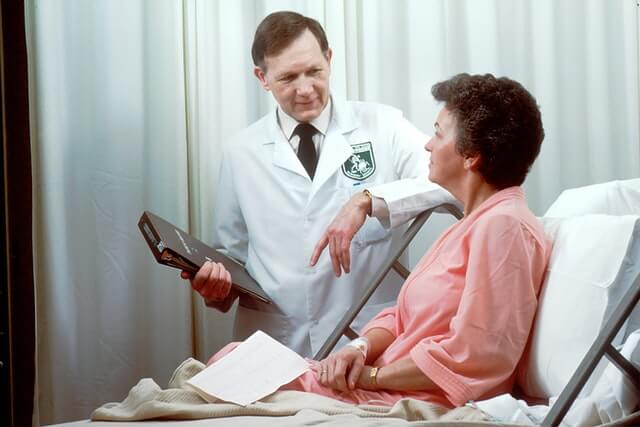What causes personality changes in the elderly?
It’s a common experience for family members and caregivers to feel like an elderly person they’ve known for years has suddenly become a stranger. Spouses who have been through decades of happy marriage may suddenly feel like they hardly know the person they married and children may begin to feel like their parent is no longer the comforting presence they once knew.
There are a number of different health issues or situations that can lead to personality changes in the elderly. Behavioral changes that feel like this may hint at underlying medical issues that need to be addressed.
It’s vital for caregivers to know what’s normal and what’s not in terms of personality changes. Behaviors like aggression or belligerence, apathy, or depression may appear suddenly and inexplicably. People who have always been gentle, easy-going, and calm their entire life may suddenly begin to have angry outbursts.
As a general rule, these behavioral changes should not be taken personally, but they do need to be taken seriously if the behavior represents a dramatic change. Below are some of the most common reasons why older individuals may manifest sudden behavioral changes and what caregivers should do in response to it:
Sadness Due to Declining Health
An older individual who retires and moves out of the family home is experiencing a major life event that can lead to profound sadness. The loss of freedom may happen as a result of health problems like a disabling illness. Often, elderly individuals experience a great deal of loss within a short period of time. A number of their friends and loved ones may have already passed on and the sadness may come out as angry outbursts.
Often, in our culture, it is hard for people to express sadness. Anger is a more socially acceptable emotion than sadness and as a result, the elder may express anger and aggression toward caregivers or loved ones as verbal or emotional abuse rather than expressing sadness through crying.
Though it can be difficult to handle this kind of anger, realize that it may signal a profound underlying sadness at the loss of loved ones and freedom. Be empathic and consider taking the elderly individual to a doctor to rule out other possible underlying medical problems.
Memory Lapses
It’s normal for elderly individuals to forget little things like where they put the keys or the name of a famous celebrity. But up to 10% of people over the age of 65 and 50% of individuals over the age of 85 will develop dementia. Symptoms of dementia include memory loss, poor judgment, difficulty with language and concentration, as well as impaired visual perception in some cases. When memory loss impacts the elder’s daily functioning, it should be evaluated immediately.
Stroke
According to the National Stroke Association, after a stroke, about 20% of survivors have cognitive impairments. The risk of developing cognitive issues such as confusion, memory loss, diminished attention span, and difficulties performing everyday activities increases with age. Behavioral changes that occur as a result of stroke depend on the area of the brain that was affected. But it isn’t uncommon for caregivers to notice pronounced personality changes in an elderly individual following a stroke. If the elderly individual who is manifesting personality changes has not been evaluated for a stroke, it’s important to get them to be evaluated as soon as possible by a doctor.
Dementia
According to the Centers for Disease Control and Prevention, about 25% of all caregivers who work with elderly individuals over age 50 are assisting someone who has dementia or some other kind of cognitive impairment. Behavioral symptoms that may signal the development of dementia include apathy, moodiness, anti-social behaviors, and difficulty with language. As a caregiver, if you notice that an elderly person has developed any of the above symptoms of dementia, it’s important to get a doctor’s evaluation as soon as possible.
Drug interactions
Polypharmacy or the use of more than one pharmacological agent or drug to treat a variety of different chronic conditions can lead to personality changes in elderly populations. If an elderly individual takes a wide range of medications daily, neurotoxicity can cause changes in behavior that mimics the signs and symptoms of dementia. If the elderly individual has recently started taking new medications, drug interaction is an important consideration and should be mentioned to the doctor when the elder is being examined.
Urinary Tract Infections
Urinary Tract Infections (UTIs) are an important consideration for elderly individuals who have recently experienced profound behavioral changes. UTIs are more common in women and older women may have trouble drinking enough water during the day which can easily lead to a UTI.
In fact, a UTI may masquerade as dementia. Behavioral symptoms associated with a UTI in elderly individuals include: confusion, agitation, and withdrawal. An individual who develops a UTI must be given antibiotics to fight the infection so if a UTI is the suspected cause of personality changes, make an appointment to see a doctor right away. To lower the risk of developing a UTI in the elderly, make sure the elder takes 1 teaspoon of D-Mannose powder daily in a cup of sugar-free cranberry juice.
Poor Sleep
As people get older, they may find it more difficult to sleep. In extreme cases, a lack of sleep can lead to memory distortion, confusion, depression, and a decrease in the individual’s mental capacity. Sleep deprivation may be difficult to diagnose because it can cause symptoms similar to dementia. A doctor may prescribe sleep medication or melatonin to treat sleep-deprivation-induced cognitive impairment.
What can cause a sudden change in personality?
People of any age may experience mood swings, irritability, and emotional ups and downs, but personality changes that are more profound should be evaluated by a doctor. An aging parent who has never uttered a curse word in their life who starts swearing inexplicably on a regular basis, for example, should be scheduled to see a doctor. Impulsiveness, paranoia, and social withdrawal are all indicators of a larger potential problem.
A drastic and sudden personality change like this that’s out of character for an elderly individual shouldn’t be ignored. Sudden changes in personality could be caused by any of the following issues:
- Urinary Tract Infection (UTI)
- Dementia
- Drug interaction
- Stroke
- Constipation
- Poor sleep over a prolonged period of time
- Grief due to the loss of loved ones or freedom
When rapid mood swings that have no logical reason behind them are alarming and out of character for an elderly individual, caregivers need to speak up and make sure the individual sees a doctor as soon as possible.
Are personality changes common in older adults?
Personality changes are common throughout the lifespan, but dramatic changes in personality that happen in older adults are generally a sign of a deeper problem. Below are common personality changes that are a normal part of the aging process along with information about when to schedule a doctor’s appointment should these personality changes go beyond a normal threshold:
● Forgetfulness
It’s normal for older individuals to be forgetful, but memory lapses should be infrequent and brief. More significant memory loss (such as forgetting someone they’ve known for years) should cue the caregiver that it’s time for the elder to be evaluated.
● Risky Behaviors
Seniors who have put off bucket-list items like skydiving or traveling abroad have a right to enjoy their golden years, but risk-taking behaviors that involve an imbalance of potential costs and rewards may be a cause of concern. For example, seniors who suddenly take up gambling, promiscuous behavior, or the use of illegal drugs may actually be manifesting signs of dementia or depression.
● Crankiness
Chronic pain, stress, and loneliness can lead to crankiness in elderly populations especially during times of transition, but seniors who are inexplicably cruel or aggressive may be suffering from deeper issues like physical pain, depression, or dementia that needs to be evaluated by a doctor.
● Sadness
Older individuals have often experienced a lot of loss, so it’s normal for them to feel sad often, especially after they lose a spouse or significant other. But sadness that lasts for many weeks or months may indicate a complicated grief response. Therapy or medication may be needed to help the individual return to a normal life.
What are some examples of behavior changes?
Impulsive Behavior
Personality changes are frequently caused by a type of brain disorder. The areas of the brain that normally control and manage behavior can be compromised such that impulsive behaviors cannot be controlled. Impulsive, unusual behaviors may include making rude, inappropriate comments or gestures, touching oneself or others in an inappropriate way, asking about or commenting on private, personal matters in other people’s lives, or even behaviors like cutting in line or taking food off of another person’s plate.
Your loved one may have been polite and had a great deal of self-control in their youth, but in old age the deterioration of brain function may lead to unusual behavior that needs to be evaluated and treated by a physician.
Apathy
This is one of the most common behavioral changes associated with dementia, and while it can be obvious and even somewhat disturbing to family members, the individual with dementia often isn’t aware of their apathetic state. Apathy can be defined as a lack of enthusiasm, interest, or indifference and passivity. This behavioral change can be particularly jarring for family members if their loved one was once vibrant and energetic.
Taking time to read about and understand apathy as it relates specifically to dementia is crucial for any family member with an elderly loved one who is manifesting this behavior. While this particular behavior change can be uncomfortable for loved ones, with the proper training and education family members can learn to readjust their expectations in order to continue having a fruitful relationship with the elder.
Aggressive/Threatening Behavior
When an elderly loved one with dementia exhibits aggressive or threatening behaviors, it can be frightening (and even dangerous) for family members. Most of the time, when an otherwise gentle or docile loved one begins behaving aggressively there is a trigger that initiates the behavior. Always consider the elder’s psychosocial environment as a possible trigger. If something in the environment made them feel a strong emotion, aggressive behavior may be a normal response. Offer “moments of connection” to the elder with stories and memories or with comfort foods, their favorite music, or something else familiar to create a calm environment.
Safety is the main thing to be aware of when an elderly loved one starts exhibiting aggressive behavior. Call the doctor or healthcare provider right away if you feel like you’re in danger or that the elder is a danger to themselves. Educate yourself about techniques and methods for handling aggressive behavior in dementia patients, and don’t be afraid to ask for help.
Anxiety
Anxiety is a common behavioral change in the elderly, especially in those individuals who have dementia. Individuals who are forgetful or suffering from some kind of illness may struggle to manage their emotions and self-control, and will look outward to their caretakers for help with managing feelings. Impaired memory in particular can lead to anxiety because it can be frightening to elderly individuals to become forgetful or confused for no apparent reason. When this happens, anxiety can set in and cause a variety of other personality and behavior changes.
In some cases, because many elderly people with dementia or impaired brain function require the help of their caregivers to manage their emotions, the individual may wander off looking for their caregiver and get lost due to an inability to remember where they are. This is another personality change that can be concerning. One of the key things to do to help the individual with anxiety is to provide them with a clean, clutter-free space and to be available to them to help them remember things when needed.
Compulsive Behavior
Some elderly individuals may start to exhibit compulsive behaviors reminiscent of Obsessive Compulsive Disorder (OCD) or other similar disorders. Compulsive behaviors such as checking locks multiple times, obsessive organization or cleaning practices, frequent visits to the bathroom, unusual collections/hoarding, or dramatic changes in eating habits are all potential changes that can occur. Often, compulsive behaviors are not done on purpose and are driven by anxiety or forgetfulness. The best way to help is to be supportive and determine if there is perhaps a need that is not being met for the individual.
Remember that if the compulsive behavior is not interfering with their daily life or yours that it may sometimes be best to avoid bringing up the behavior. Sometimes, bringing awareness to a compulsive behavior can cause more anxiety and can be counterproductive. However, offering the elderly person a different activity or identifying the potential cause of their anxiety may be able to relieve the compulsive behavior entirely.
How to Deal with Personality Changes
Dealing with personality changes in elderly patients can be a difficult task to take on, and it requires plenty of consideration and careful thought. The most important thing to remember is that the patient’s behavior is very rarely personal, and a dramatic change from happiness to apparent anger in a patient is unlikely to be your fault. Not taking the changes personally is the first key step toward being able to successfully deal with personality changes in an elderly patient.
Here are some of the other actions you can take to manage and deal with personality changes in an elderly patient or loved one:
- If the elderly person is exhibiting signs of apathy, encourage them to do things with you that they used to enjoy. Offer a controlled, organized setting in which to do these activities, and choose something that is reasonable for their particular situation and interests.
- Elderly patients with anxiety or who demonstrate compulsive anxiety-related behaviors benefit from having an adequate environment. Make sure to keep their space (as well as surrounding areas, if possible) well-organized and peaceful.
- A sudden decrease in empathy can be difficult to work with, but it can be managed often by communicating your feelings about the elderly person’s actions. Thank them and express gratitude when they act and speak appropriately, and explain your feelings when they behave or speak inappropriately.
- If your elderly patient or loved one exhibits aggressive or threatening behavior, the first most important thing to do is to ensure that both you and the patient are physically safe. If you or your patient/loved one are in any kind of danger, call for help immediately.
Dealing with personality changes in the elderly can be difficult and uncomfortable, especially for those family members who were closest to them. Although the individual may not recover their normal youthful personality entirely, with proper treatment, patience, and dedication the elderly loved one and family members should still be able to interact productively throughout their golden years.






